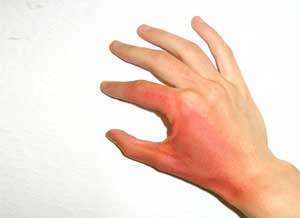- Home
- Editorial
- News
- Practice Guidelines
- Anesthesiology Guidelines
- Cancer Guidelines
- Cardiac Sciences Guidelines
- Critical Care Guidelines
- Dentistry Guidelines
- Dermatology Guidelines
- Diabetes and Endo Guidelines
- Diagnostics Guidelines
- ENT Guidelines
- Featured Practice Guidelines
- Gastroenterology Guidelines
- Geriatrics Guidelines
- Medicine Guidelines
- Nephrology Guidelines
- Neurosciences Guidelines
- Obs and Gynae Guidelines
- Ophthalmology Guidelines
- Orthopaedics Guidelines
- Paediatrics Guidelines
- Psychiatry Guidelines
- Pulmonology Guidelines
- Radiology Guidelines
- Surgery Guidelines
- Urology Guidelines
Useful tips for prevention and management of burn injuries

During Burn Awareness Week, Loyola's Burn Center has advanced Useful tips for prevention and management of burn injuries to prevent and manage burn injuries.Loyola the largest burn center in Illinois has outstanding success rates in managing Burn injuries, a leading cause of unintentional death and injury in the United States. Its multidisciplinary approach has been recognized and commended by the American College of Surgeons and American Burn Association.
Tips for Burn Prevention
Reduce water temperature: Set the thermostat on your water heater to below 120 F (48.9 C).
Address outlets and electrical cords: Cover unused electrical outlets with safety caps. Replace damaged electrical cords.
Kitchen safety: Wear short, close-fitting or tightly rolled sleeves when cooking. Turn pot handles away from the stove’s edge and never use wet oven mitts or potholders. Hot cookware can heat moisture in a potholder or hot pad, resulting in a scald burn.
General fire safety: Never leave candles or open flames unattended. Put smoke alarms throughout the house and check the batteries.
Tips for Burn Care
If a burn injury does happen:
1) Cool the burn with cool (not cold) water to stop the burning process
2) Remove all clothing and/or diaper from the injured area
3) Cover the area with a clean dry sheet or bandages
4) Seek medical attention
When to Seek Medical Attention
Treatment of burns depends on the location and severity of the injury. While some can be treated at home, people with severe burns often require treatment at specialized burn centers. You should seek medical attention when:
- Burns are covering hands, feet, face, groin, buttocks, major joints or a large area of the body
- Burns are deep
- Burns are caused by chemicals or electricity
- Burns affect the airway, making it difficult to breathe
- Large blisters appear
- Signs of infection begin, such as oozing from the wound, increased pain, redness and swelling
- A burn or blister doesn't heal in several weeks
Next Story
NO DATA FOUND

Disclaimer: This site is primarily intended for healthcare professionals. Any content/information on this website does not replace the advice of medical and/or health professionals and should not be construed as medical/diagnostic advice/endorsement or prescription. Use of this site is subject to our terms of use, privacy policy, advertisement policy. © 2020 Minerva Medical Treatment Pvt Ltd